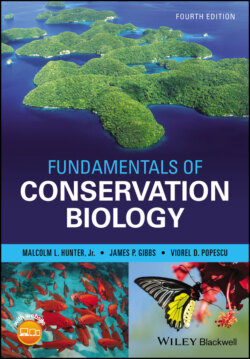Читать книгу Fundamentals of Conservation Biology - Malcolm L. Hunter Jr. - Страница 15
CHAPTER 1 Conservation and Conservation Biology What Is Conservation?
ОглавлениеSince the beginning of humanity people have been concerned about their environment and especially its ability to provide them with food, water, and other resources. As our numbers have grown and our technology has developed, so has the impact we are having on our environment, and thus we are becoming increasingly concerned. Media everywhere proclaim the current issues:
“Conservationists call for tighter fishing regulations.”
“Ecologists describe consequences of warmer climates.”
“Environmentalists criticized by chemical industry.”
“Preservationists seek more wilderness.”
These headlines also reveal an ambiguous terminology. Are we talking about conservation or preservation? Are the issues ecological or environmental? Students deciding which university to attend and which major to select are faced with a bewildering array of choices – soil and water conservation, environmental studies, natural resource management, conservation biology, wildlife ecology, human ecology, and more – that intertwine with one another. In this chapter we will try to resolve these ambiguities by examining how they are rooted in human history and ethics. To start on common ground we explore the key differences and similarities among conservationists, preservationists, environmentalists, and ecologists. In the second part of the chapter we will see where conservation biology fits into this picture.
A conservationist is someone who advocates or practices the sustainable and careful use of natural resources. Foresters who prudently manage forests, hunters and fishers who harvest wild animal populations sustainably, and farmers who practice the wise use of soil and water are all conservationists. Citizens who are concerned about the use of natural resources are also conservationists and sometimes they assert that the activities of foresters, fishers, farmers, and other natural resource users are not prudent, sustainable, or wise. In theory, arguments over who is, or is not, a conservationist should turn on the issue of what is sustainable. In practice, most foresters, farmers, ranchers, and others – many of whom are careful stewards of the lands and waters they control – have ceded the title “conservationist” to their critics.
A preservationist advocates allowing some places and some creatures to exist without significant human interference. Most people accept the idea that conservation encompasses setting aside certain areas as parks and protecting certain species without harvesting them. The divisive issues are: how many and which areas, and which species. Many resource users believe that enough areas have already been closed to economic use, and they use “preservationist” as a negative term for people they consider to be extremists. Ironically, in the case of some set asides, like marine reserves, their preservation boosts fish harvests in surrounding areas. Nevertheless, because of this pejorative use, relatively few people call themselves preservationists. People who find themselves labeled preservationists by others usually prefer to think of preservation as just one plank in their platform as conservationists.
An environmentalist is someone who is concerned about the impact of people on environmental quality in general. Air and water pollution are often the proximate concerns; human overpopulation and wasteful use of resources are the ultimate issues. There is enormous overlap between environmentalists and conservationists. Many environmentalists would say that environmentalism encompasses conservation, while many conservationists would say the reverse. The difference is a matter of emphasis. By focusing on air and water pollution and their root causes, environmentalists often emphasize urban, suburban, and agricultural situations where human‐induced problems and human well‐being are paramount. Because conservationists focus on natural resource use, they tend to emphasize the rural areas and wildlands where natural resources are most abundant, as well as associated ecosystems and organisms, including people who might live there.
Traditionally, an ecologist is a scientist who studies the relationships between organisms and their environments. However, in the 1970s when concern for the environment first bloomed widely around the planet, the term developed a second meaning when the public failed to distinguish between environmentalists (activists) and the scientists (ecologists) who provided the scientific basis for the environmental movement. Now “ecologist” is often used in the popular press as a synonym for “environmentalist.” Given this, a broader definition of an ecologist is a person who is concerned about the relationships between organisms (including people) and their environments.
Recently, these distinctions have become controversial and fuzzy, following a call for a “new conservation” that focuses on the benefits that nature provides for people (Kareiva and Marvier 2012) and the ways that people and nature depend on one another. This “conservation for people” movement is controversial because other people believe that conservation should also recognize the intrinsic value of nature (see next section). It is fuzzy because people on both sides of the argument have lost sight of the fact that the origins of conservation (also see next section) were largely centered on human welfare (Hunter et al. 2014).
In summary, ever‐evolving attitudes and perceptions are at the root of the confusion over who are conservationists, preservationists, environmentalists, and ecologists; each term persists because it has some utility in describing the diverse ways people interact with their environment.
